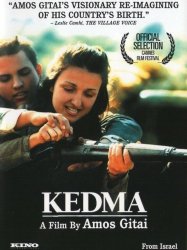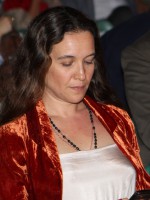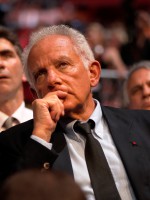Alain Mamou Mani is a Producer French born on 26 december 1949

Alain Mamou-Mani (né le 26 décembre 1949, à Nabeul, Tunisie) est un auteur et un producteur français.
Après neuf ans comme informaticien et délégué CFDT à la Banque nationale de Paris, il crée, en 1979, avec Joël Grynbaum, une des premières start-up françaises : Go International. Il revend cette société en 1988 au groupe américain Computer Sciences Corporation et se lance dans la communication et les médias. En 1989, il devient directeur général du groupe Nova Press de Jean-François Bizot, (Actuel, Radio Nova). Il a été membre des comités de rédaction des revues Hérodote et Interférences.
Par ailleurs, militant de Mai 68, il travaille sur le thème de l'autogestion, sujet de son DEA à l'École pratique des Hautes Études sous la direction de Raymond Aron, qui le verra évoluer au Parti socialiste unifié, puis à Génération écologie dont il est l'un des fondateurs avec Brice Lalonde et Jean-Louis Borloo.
Alain Mamou-Mani est le frère de Président du Syntec Numérique Guy Mamou-Mani et le père de l'architecte Arthur Mamou-Mani.
En 1992, il fonde le magazine Décision-Environnement qui fusionne en 2000 avec Environnement Magazine.
Il a fondé l'association Orée en 1993 qu'il préside jusqu'en 1996.
Il a écrit plusieurs ouvrages (essais, romans) dont La Vie en vert, Au-delà du profit et il participe à Les Dix Commandements (comédie musicale) avec Albert Cohen; il sortira un livre lié au spectacle avec Monseigneur Thomas, Dalil Boubakeur et Joseph Haïm Sitruk.
En septembre 1998, le mathématicien Robert Azencott, ancien professeur à l’École normale supérieure, demande à Alain Mamou-Mani de devenir Directeur Général de la start-up Miriad Technologies, poste qu'il occupera jusqu'à fin 2001.
Alain Mamou-Mani produit plusieurs films avec Michel Propper dans MP Productions (2001-2008) et Quid Novi (2008-), prenant en outre la fonction de directeur général du groupe BAC Films (2002-2003) de Jean Labadie dont les accords initiaux avec Jean-Marie Messier (ex-PDG de Vivendi Universal), et Studio Canal (qui détient 80 % de Bac Distribution) provoquent la chute, et la revente à Millimages, en 2003.
De novembre 2014 a juin 2015, il a été secrétaire général de l'association présidée par Jean-Louis Borloo : Énergies pour l'Afrique, pour permettre l’accès à l’électricité à tous les africains.
En août 2015, intéressé par l'étiopathie, il dit sur RTL être sensible à la douleur des autres, tel un scanner, et apprend intuitivement à Didier van Cauwelaert, avoir fait une NDE, à la naissance.
Il continue à écrire des livres, des pièces de théâtre, des scénarios...
Source : Wikidata
Alain Mamou Mani

- Infos
- Photos
- Best films
- Family
- Characters
- Awards
Nationality France
Birth 26 december 1949 (75 years)
Awards Knight of the National Order of Merit, Officer of the National Order of Merit
Birth 26 december 1949 (75 years)
Awards Knight of the National Order of Merit, Officer of the National Order of Merit
Biography
Né à Nabeul, il est envoyé en pension au Lycée de Carthage avant l'indépendance et l'exode en France. Puis il intègre le lycée Carnot de Tunis jusqu'en Math Sup. En 1967, il obtient une maîtrise en informatique à la faculté des sciences Paris VI de Jussieu à Paris.Après neuf ans comme informaticien et délégué CFDT à la Banque nationale de Paris, il crée, en 1979, avec Joël Grynbaum, une des premières start-up françaises : Go International. Il revend cette société en 1988 au groupe américain Computer Sciences Corporation et se lance dans la communication et les médias. En 1989, il devient directeur général du groupe Nova Press de Jean-François Bizot, (Actuel, Radio Nova). Il a été membre des comités de rédaction des revues Hérodote et Interférences.
Par ailleurs, militant de Mai 68, il travaille sur le thème de l'autogestion, sujet de son DEA à l'École pratique des Hautes Études sous la direction de Raymond Aron, qui le verra évoluer au Parti socialiste unifié, puis à Génération écologie dont il est l'un des fondateurs avec Brice Lalonde et Jean-Louis Borloo.
Alain Mamou-Mani est le frère de Président du Syntec Numérique Guy Mamou-Mani et le père de l'architecte Arthur Mamou-Mani.
En 1992, il fonde le magazine Décision-Environnement qui fusionne en 2000 avec Environnement Magazine.
Il a fondé l'association Orée en 1993 qu'il préside jusqu'en 1996.
Il a écrit plusieurs ouvrages (essais, romans) dont La Vie en vert, Au-delà du profit et il participe à Les Dix Commandements (comédie musicale) avec Albert Cohen; il sortira un livre lié au spectacle avec Monseigneur Thomas, Dalil Boubakeur et Joseph Haïm Sitruk.
En septembre 1998, le mathématicien Robert Azencott, ancien professeur à l’École normale supérieure, demande à Alain Mamou-Mani de devenir Directeur Général de la start-up Miriad Technologies, poste qu'il occupera jusqu'à fin 2001.
Alain Mamou-Mani produit plusieurs films avec Michel Propper dans MP Productions (2001-2008) et Quid Novi (2008-), prenant en outre la fonction de directeur général du groupe BAC Films (2002-2003) de Jean Labadie dont les accords initiaux avec Jean-Marie Messier (ex-PDG de Vivendi Universal), et Studio Canal (qui détient 80 % de Bac Distribution) provoquent la chute, et la revente à Millimages, en 2003.
De novembre 2014 a juin 2015, il a été secrétaire général de l'association présidée par Jean-Louis Borloo : Énergies pour l'Afrique, pour permettre l’accès à l’électricité à tous les africains.
En août 2015, intéressé par l'étiopathie, il dit sur RTL être sensible à la douleur des autres, tel un scanner, et apprend intuitivement à Didier van Cauwelaert, avoir fait une NDE, à la naissance.
Il continue à écrire des livres, des pièces de théâtre, des scénarios...
Usually with
Filmography of Alain Mamou Mani (2 films)
Producer

Alila (2003)
, 2h2Directed by Amos Gitaï
Origin Israel
Genres Drama, Comedy
Themes Films about religion, Films about Jews and Judaism
Actors Yaël Abecassis, Hana Laszlo, Ronit Elkabetz, Amos Lavi
Roles Producer
Rating61%





Instead of written credits at the beginning of the film, Gitai reads out the credits, introduces himself to the viewer, and explains that Alila is based on the novel Returning Lost Love. The rest of the movie is made up of forty individual single shot scenes depicting the lives of several Israelis. The character's lives overlap and collide. Gabi, a bobbed haired sexpot, and her lover Hezi—who's older, balding and married—rent a room to have an affair, while Ezra, a pot bellied divorcee, supervises an illegal construction site next door. All this racket drives Schwartz, a Holocaust survivor, to a mental breakdown. Other characters include illegal immigrants, a teenage boy who's afraid to serve in the army, and a corrupt police officer. In each scene the camera moves through walls, over desks, and around rooms in order to keep focused on the character it's following, in moments of drama as well as in moments of mudane daily activity.

Kedma (2002)
, 1h40Directed by Amos Gitaï
Origin Israel
Genres Drama, War
Themes Films about religion, Films about Jews and Judaism
Actors Moni Moshonov, Juliano Mer-Khamis, Sendi Bar, Yaël Abecassis
Roles Producer
Rating60%





The film is a historical tragedy set during the opening stages of Israel's 1948 War of Independence. The film follows the fate of a group of refugees from the Holocaust who are illegally brought to Israel by the Palmach. When they arrive, they are chased by British soldiers. Once they escape, they are immediately drafted into the war, and take part in a grueling battle against Arab irregulars. The film centers on two long monologues, one by an Arab peasant who pledges to oppose the Jews forever; and one by an emotionally demolished refugee who laments the seemingly endless suffering of his people. Gitai intended the film to be a more realistic answer to the romanticized depiction of the war in Otto Preminger's Exodus. The final shot of Kedma is identical to the final shot of Preminger's film.
 Connection
Connection




